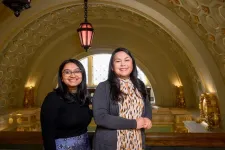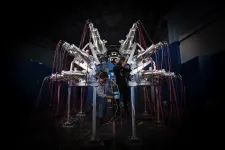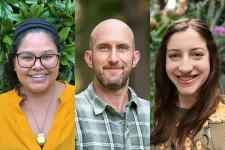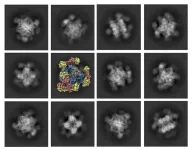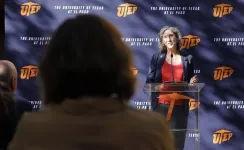(Press-News.org) CHAMPAIGN, Ill. — Having a chronic illness is a great deal of work, communication researchers have long known. But having an illness that is stigmatized, not well understood or not perceived as a priority by clinicians is uniquely burdensome for many women, who find themselves struggling to establish both the legitimacy of their medical problems and their credibility with clinicians, family members and friends, a recent study suggests.
Sasha, a 25-year-old woman interviewed for the project, told the researchers she has a binder 3 inches thick containing all her medical records that she lugs to every doctor’s appointment to provide documentation of her symptoms, tests and treatments.
Sasha, identified by a pseudonym, is not unique, the researchers say. Often labelled “crazy” by those around them or perceived as difficult patients when they challenge physicians’ opinions, women whose undiagnosed health concerns have been dismissed in the past feel as if they are “on trial” and adopt strategies similar to those of defendants preparing their case for court, according to communication professor Charee Thompson and her co-authors, graduate students Sara Babu and Shana Makos, all of the University of Illinois Urbana-Champaign.
They published their findings in the journal Communication Research.
“These patients’ preparations for doctors’ appointments involve extensive research about their symptoms, possible treatments and their doctors’ expertise and backgrounds,” Thompson said. “They carefully build their case by collecting evidence such as keeping logs of their symptoms or recording their heart rate with their Fitbit and taking it to the appointment. And they marshal witnesses, coordinating the timings of their appointments with family members so they can attend to corroborate their experiences.”
Sasha was one of 36 pseudonymous women across the U.S. managing chronic illnesses who were interviewed for the project, which explored the credibility work women undertook when their medical problems were treated dismissively by skeptical providers, family members and friends.
Credibility work was defined in the study as the activities patients used to validate their medical problems, gain social support and establish their need for treatment.
Ranging in age from 21-70, most of the women were white, eight were multiracial, six were Black and three were Filipina, Hispanic or of Middle Eastern descent. They were the same population as that in the researchers’ prior study about medical disenfranchisement – also called medical gaslighting, defined by the researchers as the denial of a person’s symptoms or knowledge of their body. That study was published in the journal Health Communication.
Patients’ difficulties obtaining treatment are compounded when they have an intersecting, socially devalued identity – such as their race, gender or mental health history – that providers may associate with damaging preconceptions about their credibility and basic knowledge of their body, Thompson said.
Many of those interviewed described feeling frustrated and angry at being shamed, silenced and dehumanized during past medical interactions and said that clinicians reflexively attributed their physical symptoms to psychological problems without medical evidence to support a mental illness diagnosis.
Maria, a 26-year-old white Pacific Islander, told the researchers she asks her husband to accompany her to office visits because physicians are more apt to listen to a male than to her.
When presenting their case to health professionals, these patients recounted how they carefully described their symptoms in an objective, controlled manner and in other ways they believed would convey validity; fastidiously managed their appearance, including how they dressed; and monitored providers’ reactions for evaluative clues while talking to them.
When their pain or concerns were challenged, discounted or minimized by providers, these women told the researchers they often felt too vulnerable to object or withstand critical reactions. Instead, they pivoted to less “face-threatening” strategies such as asking questions to indirectly dispute providers’ diagnoses or opinions, obtain clarifications and request referrals.
This was one of several “double binds” or no-win communication situations these patients found themselves in during these encounters, along with awareness they needed to appear physically ill enough or in sufficient distress to warrant medical intervention – while taking care to avoid being perceived as overly dramatic or attention-seeking.
“But if patients seem too rational and controlled, expressing minimal emotion or distress, then providers may conclude there is nothing really wrong with them,” Thompson said.
Participants struggled to strike a balance of being informed patients who were appropriately assertive and self-advocates – confronting mistreatment, poor service and diagnoses they disagreed with – without threatening providers’ sense of expertise, alienating their staff if they complained about something or being labelled a “complainer” or “nasty.”
Intertwined with these dilemmas are moral judgments about which societal members are worthy of being evaluated and treated – and those who are “not doctorable or are burdensome, wasteful and malingering,” the researchers wrote.
“And to me, that’s one of the most important findings of this study: to recognize all sorts of the double binds that people face, and for providers to not perpetuate these situations and to validate folks who feel like there’s no winning,” Thompson said. “Because there are situations where there is no winning since they’re set up that way – to reinforce power imbalances in these doctor-patient relationships. They shouldn’t be.”
While the study explored the medical context of credibility work, it is important to realize that these forms of doubt and disempowerment occur in “our everyday lives and our personal relationships in ways that are equally pernicious,” she said. “And we all have a responsibility –whether we are a provider, family member or a friend – to check our biases and our assumptions and understand how they might perpetuate or prolong someone’s suffering. The default should be belief and support.”
END
Women seeking credibility in health care feel ‘on trial,’ struggle with constraints of double binds
Patients' quest for credibility, validation of their medical problems significantly adds to the burden of being ill
2023-09-28
ELSE PRESS RELEASES FROM THIS DATE:
Chi-Nu experiment ends with data to support nuclear security, energy reactors
2023-09-28
The results of the Chi-Nu physics experiment at Los Alamos National Laboratory have contributed essential, never-before-observed data for enhancing nuclear security applications, understanding criticality safety and designing fast-neutron energy reactors. The Chi-Nu project, a years-long experiment measuring the energy spectrum of neutrons emitted from neutron-induced fission, recently concluded the most detailed and extensive uncertainty analysis of the three major actinide elements — uranium-238, uranium-235 and plutonium-239.
“Nuclear fission and related nuclear chain ...
Researchers dynamically tune friction in graphene
2023-09-28
The friction on a graphene surface can be dynamically tuned using external electric fields, according to researchers at the University of Illinois Urbana-Champaign led by Professor Rosa Espinosa-Marzal of the Department of Civil and Environmental Engineering. The work is detailed in the paper, “Dynamically tuning friction at the graphene interface using the field effect,” published September 19, 2023, in the journal Nature Communications.
Friction plays a key role in both natural and engineered systems, dictating the behavior of sliding contacts, affecting ...
Polyps as pixels: innovative technique maps biochemistry of coral reefs
2023-09-27
Using an innovative new approach to sampling corals, researchers at the University of Hawai‘i (UH) at Mānoa are now able to create maps of coral biochemistry that reveal with unprecedented detail the distribution of compounds that are integral to the healthy functioning of reefs. Their study was published today in Communications Biology.
“This work is a major step in understanding the coral holobiont [the coral animal and all of its associated microorganisms], which is critical for reef restoration and management,” said lead author Ty Roach, who conducted this study as a postdoctoral researcher at the Hawai‘i Institute of Marine Biology (HIMB) in the UH ...
Study shows how brain tumors make certain immune cells turn traitor
2023-09-27
September 27, 2023, NEW YORK – A Ludwig Cancer Research study has for the first time exhaustively analyzed immune cells known as neutrophils that reside in brain tumors, including gliomas, which develop in the brain itself, and cancers that spread there from the lung, breast and skin.
Led by Ludwig Lausanne’s Johanna Joyce and Roeltje Maas, an MD-PhD student in her laboratory, the study also details the key role neutrophils play in ensuring the survival of brain cancers and exposes the mechanisms by which the tumor microenvironment (TME) tweaks their biology to turn them into enablers of malignant growth. Its findings suggest new approaches ...
State politics, industry drive planetary health education for K-12 students in US
2023-09-27
CHAMPAIGN, Ill. — As much of the U.S. broils under record-setting temperatures, battles wildfires and is rocked by fierce storms, a new study suggests that the science learning standards for many public schools are not preparing young people to understand and respond to problems such as climate change that will dramatically impact their lives and those of millions of people around the globe.
Published in the Proceedings of the Royal Society B: Biological Science, the findings raise troubling questions about political bias shaping if and what the nation’s ...
UCLA-led team develops key improvement to Nobel Prize-winning technology
2023-09-27
The scientists who received the 2017 Nobel Prize in chemistry were honored for their development of a technique called cryo-electron microscopy, or cryo-EM. The technology was revolutionary because it enabled scientists to see the atomic structure of biological molecules in high resolution.
But cryo-EM still had a catch: It was only effective for imaging large molecules.
Now, UCLA biochemists, working with pharmaceutical industry scientists, have developed a solution that will make it possible for cryo-EM to acquire high-quality images of smaller protein molecules, too. The scientists engineered a 20 nanometer, cube-shaped ...
UTEP awarded $7 million to support Hispanic-serving institutions across the country
2023-09-27
EL PASO, Texas (Sept. 27, 2023) — The University of Texas at El Paso has been chosen to become a center of thought leadership for Hispanic Serving Institutions (HSIs) across the country, thanks to a new $7 million grant from the National Science Foundation (NSF).
The new grant, known as NODE (Network Opportunities for Developing Equitable and Effective Evaluation at HSIs), is a six-year investment that will position UTEP to provide the first full portrait of the effectiveness of all grants funded by the NSF HSI program. Anne-Marie Núñez, Ph.D., executive director of the Diana Natalicio Institute ...
JWST's first spectrum of a TRAPPIST-1 planet
2023-09-27
Image
In a solar system called TRAPPIST-1, 40 light years from the sun, seven Earth-sized planets revolve around a cold star.
Astronomers obtained new data from the James Webb Space Telescope (JWST) on TRAPPIST-1 b, the planet in the TRAPPIST-1 solar system closest to its star. These new observations offer insights into how its star can affect observations of exoplanets in the habitable zone of cool stars. In the habitable zone, liquid water can still exist on the orbiting planet's surface.
The ...
Wild Asian elephants display unique puzzle solving skills
2023-09-27
New York, September 27, 2023 – Individual innovation is considered one sign of intelligence within species, and elephants are among the animals that researchers have long taken an interest in because of their sophisticated approach to problem solving. A newly published study in the journal Animal Behaviour details findings from a six-month-long study documenting the abilities of individual wild Asian elephants to access food by solving puzzles that unlocked storage boxes.
“This is the first research study to show that individual wild elephants have different willingness and abilities to problem solve in ...
Mainstay malaria drug may be beginning to fail in the Horn of Africa
2023-09-27
In eastern Africa, malaria parasites have developed resistance to artemisinins, the backbone of current treatment regimens, a development that could dramatically worsen malaria’s impact if partner drugs fail in the future.
The finding from studies in Eritrea was reported Sept. 28 in the New England Journal of Medicine by a team of researchers led by Didier Ménard, PhD, of the Université de Strasbourg/Institut Pasteur in France and including Columbia University microbiologist David Fidock, PhD, the C.S. Hamish Young Professor of Microbiology & Immunology and professor of medical sciences in the Vagelos College of Physicians and Surgeons.
Treatment ...
LAST 30 PRESS RELEASES:
Insufficient sleep among US adolescents across behavioral risk groups
Long COVID and recovery among US adults
Trends in poverty and birth outcomes in the US
Heterogeneity of treatment effects of GLP-1 RAs for weight loss in adults
Within-person association between daily screen use and sleep in youth
Low-dose lithium for mild cognitive impairment
Catheter ablation and oral anticoagulation for secondary stroke prevention in atrial fibrillation
A new theory of brain development
Pilot clinical trial suggests low dose lithium may slow verbal memory decline
Bioprinting muscle that knows how to align its cells just as in the human body
A hair-thin fiber can read the chemistry of a single drop of body fluid
SwRI develops magnetostrictive probe for safer, more cost-effective storage tank inspections
National report supports measurement innovation to aid commercial fusion energy and enable new plasma technologies
Mount Sinai, Uniformed Services University join forces to predict and prevent diseases before they start
Science of fitting in: Do best friends or popular peers shape teen behavior?
USF study: Gag grouper are overfished in the Gulf; this new tool could help
New study from Jeonbuk National University finds current climate pledges may miss Paris targets
Theoretical principles of band structure manipulation in strongly correlated insulators with spin and charge perturbations
A CNIC study shows that the heart can be protected during chemotherapy without reducing antitumor efficacy
Mayo Clinic study finds single dose of non-prescribed Adderall raises blood pressure and heart rate in healthy young adults
Engineered immune cells show promise against brain metastases in preclinical study
Improved EV battery technology will outmatch degradation from climate change
AI cancer tools risk “shortcut learning” rather than detecting true biology
Painless skin patch offers new way to monitor immune health
Children with poor oral health more often develop cardiovascular disease as adults
GLP-1 drugs associated with reduced need for emergency care for migraine
New knowledge on heritability paves the way for better treatment of people with chronic inflammatory bowel disease
Under the Lens: Microbiologists Nicola Holden and Gil Domingue weigh in on the raw milk debate
Science reveals why you can’t resist a snack – even when you’re full
Kidney cancer study finds belzutifan plus pembrolizumab post-surgery helps patients at high risk for relapse stay cancer-free longer
[Press-News.org] Women seeking credibility in health care feel ‘on trial,’ struggle with constraints of double bindsPatients' quest for credibility, validation of their medical problems significantly adds to the burden of being ill
